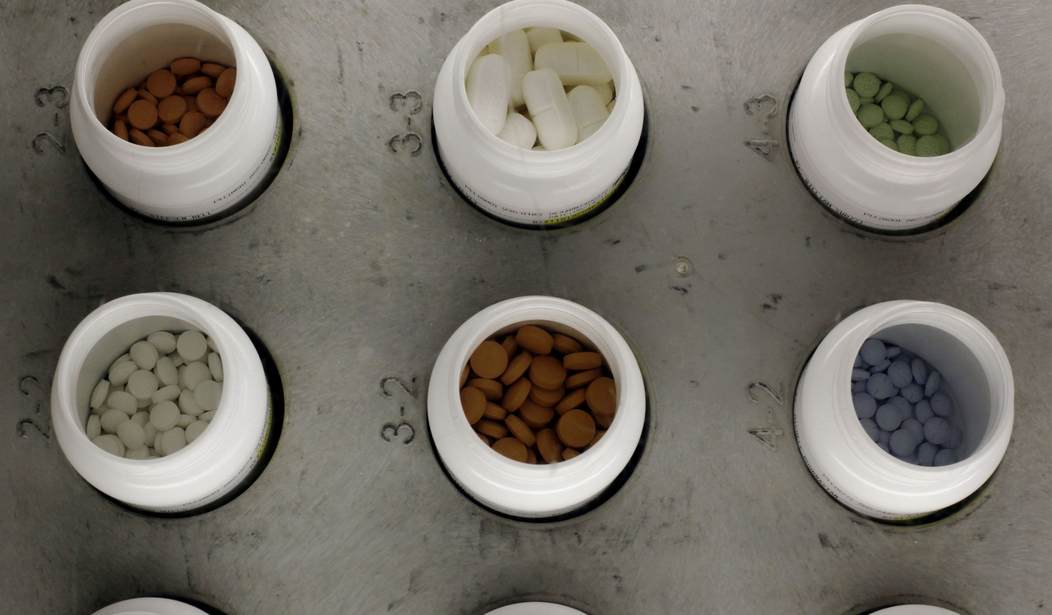Since Nancy Pelosi first became Speaker of the House in 2007, Republicans have spent an incredible amount of time, energy, and political capital pushing back against her extreme progressive policy proposals. That’s why it’s especially odd that the GOP’s newest drug pricing bill is a watered-down copy of one of Pelosi’s very worst big government ideas.
Earlier this month, Speaker Pelosi introduced H.R. 3, a drug pricing bill that would install what Senate Majority Leader Mitch McConnell called “socialist price controls” on most Medicare and Medicaid prescriptions. H.R. 3 would cause the price of certain drugs to soar, reduce the availability of many prescriptions, and dry up investment in innovative, life-saving drugs.
Republicans on the Senate Finance Committee responded to Pelosi with their own, competing legislation. The GOP drug pricing plan would install an inflation penalty that functions, according to Sen. Pat Roberts (R-KS), as socialist “price controls” on Medicare medicines. And just like the House Democrats’ drug pricing plan, the Republicans version would cause the price of certain drugs to soar, reduce the availability of many prescriptions, and dry up investment in innovative, life-saving drugs.
In other words, there’s not a dime’s worth of difference between the Democrats’ troubling drug pricing scheme and the Republican alternative.
Pelosi’s H.R. 3 would cap the price of prescriptions at 120% of the average price of the drug in Australia, Canada, France, Germany, Japan, and the United Kingdom. Since all six of the countries operate socialized medicine programs that allow the government to manipulate prices and subsidize costs with taxpayers’ money, drug prices have little relationship to actual cost or value of the medicines.
Price controls on medicines have had devastating consequences in the countries Pelosi wants to emulate.
Of 220 new drugs launched from 2011 to 2017, 90% were available in the United States. Just two-thirds were available to patients in the UK, only half were offered in Canada and France, and a paltry one-third were available in Australia.
Even when drugs are made available for sale in these countries, shortages are common. In France, a quarter of patients have been unable to get their prescriptions because of drug shortages. Last year, Canada’s government reported 4,400 drug shortages. Critical drugs for treating cancer, seizures and diabetes were nowhere to be found.
Medical innovation has also dried up in these countries. The portion of new medicines originating from the UK, France and Germany has been slashed in half over the past 40 years, as European drug makers flee regulations and price controls for greener pastures in the United States.
To make Pelosi’s terrible plan even worse, if a drugmaker refuses to allow the government to limit the prices of a medication, the feds slap a 95% tax on the drug. The tax could apply to nearly all of the most popular prescriptions in America – drastically raising the price Americans pay for vital medicines.
Unfortunately, the Senate Republicans’ alternative drug pricing plan is plagued with many of the same problems as Pelosi’s proposal.
Even though Republicans call their price control scheme an “inflation penalty,” it functions the same as Pelosi’s socialist price cap. Under the GOP bill, if a drug price increases beyond the rate of inflation, the manufacturer has to pay a fine to the federal government equal to that cost hike.
In addition to the Senate Republicans’ price cap, they also want force drug manufacturers to pay 20% of seniors’ prescription costs once an individual’s out-of-pocket-costs reaches a certain amount – about $3,100 annually if the GOP gets its way.
The price caps, taxes, penalties and payments the House Democrats and Senate Republicans want won’t do much to actually lower costs to patients, but they will almost certainly cause Americans to die. That’s because these “solutions” all remove the incentive for drug manufacturers to invest money into R&D.
It costs an average of $2.6 billion to bring a new drug to market, according to a Tufts University study. Under both proposals being floated in Congress, manufacturers would find it almost impossible to recoup their investment in developing new medicines. Not only would incentives to create groundbreaking, life-saving medicines vanish, competition that lowers the price of drugs would dry up as well.
As Republicans head into the 2020 elections, many Americans are starving for free market health care solutions – not more socialist schemes that reduce options, make medications harder to find and threaten the future of life-saving new drugs.
Senate Republicans should scrap their rip-off of the Democrats’ prescription proposal and do more to differentiate themselves from Speaker Pelosi’s big government drug pricing plan.
Drew Johnson is a senior fellow at the National Center for Public Policy Research.
























Join the conversation as a VIP Member